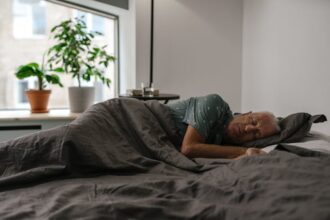A study from Karolinska Institutet published in eBioMedicine reveals that poor sleep could make the brain appear older than its actual age. The research suggests that low-grade inflammation may play a role in this link. While inadequate sleep is known to be associated with dementia, it remains unclear whether it causes the disease or is a precursor. This new study aims to shed light on the connection between sleep habits and brain ageing.
The study analysed data from 27,500 middle-aged and older individuals from the UK Biobank, who underwent brain MRIs. Machine learning was used to estimate their brain’s biological age, comparing it with their chronological age. The participants were asked about five key sleep factors: chronotype (whether they were morning or evening types), sleep duration, insomnia, snoring, and daytime sleepiness.
Participants were then categorised into three groups based on their sleep quality: healthy, intermediate, or poor. The study found that the gap between brain age and chronological age increased by about six months for every point decrease in sleep quality. People with poor sleep had brains that appeared, on average, one year older than their actual age.
To investigate the cause, researchers examined levels of low-grade inflammation, which could explain around 10% of the brain age discrepancy. Abigail Dove, the lead researcher, suggested that inflammation could be one of the key mechanisms behind the link between poor sleep and accelerated brain ageing.
The study also considered other potential factors, such as poor sleep’s effect on the brain’s waste clearance system, which is most active during sleep. Additionally, the researchers proposed that inadequate sleep could affect cardiovascular health, which in turn impacts the brain. These factors may contribute to the observed brain ageing.
While the findings are insightful, there are limitations. The UK Biobank participants tend to be healthier than the general population, which may affect the generalisability of the results. Moreover, since sleep data was self-reported, the accuracy of the sleep quality assessment could also be a concern. Despite these limitations, the study offers promising insights into how improving sleep could slow brain ageing.
More information: Abigail Dove et al, Poor sleep health is associated with older brain age: the role of systemic inflammation, EBioMedicine. DOI: 10.1016/j.ebiom.2025.105941
Journal information: EBioMedicine Provided by Karolinska Institutet








